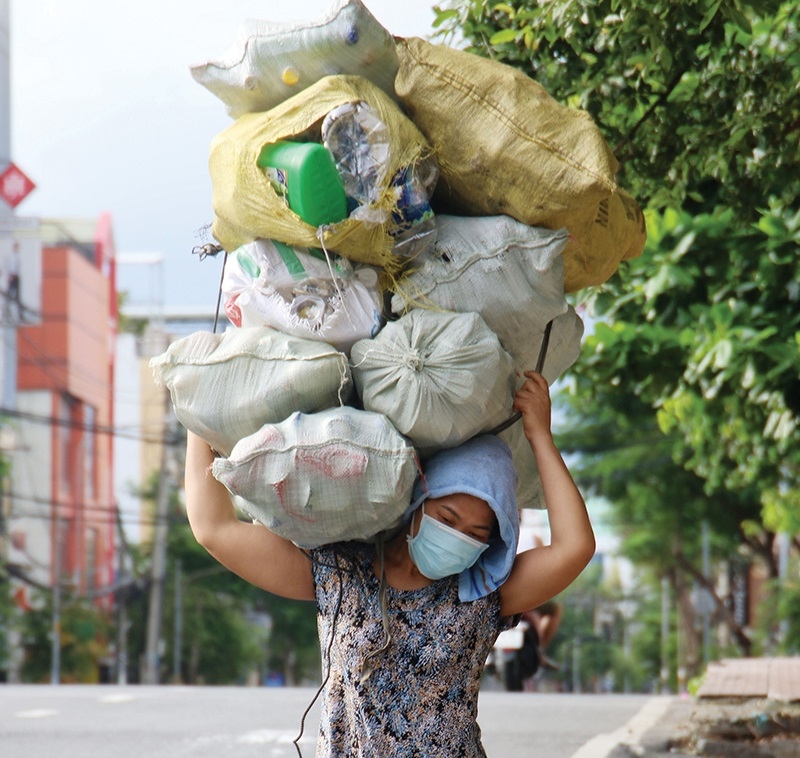Gender gap progress at risk via pandemic
 |
| Women are disproportionately taking the biggest hit in the pandemic. Photo: Le Toan |
Ngoc Nguyen, a 33-year-old living in Hanoi’s Cau Giay district, received a master’s degree from the University of Sydney at the end of 2019. For most of the past two years she has been taking care of children and doing housework. When she first returned to her country, she received many attractive job offers, but the pandemic and prolonged periods of social distancing caused her to temporarily put aside her dreams.
“Since the outbreak, I have not been able to send my children to school. No company allows employees to take long leave, so I have had to change jobs several times over the past year. My income is higher than my husband’s, but if a person has to stay home to take care of children, that person will always have to be me,” shared Ngoc.
Ngoc’s case is a common one in Vietnam. According to the report of the International Labour Organization (ILO) on gender and the labour market from March, women spend an average of 20.2 hours per week cleaning the house, washing clothes, cooking, shopping, and taking care of the family while men spend only 10.7 hours. Nearly a fifth of men spend no time doing housework.
These numbers are likely to increase even more during the pandemic as working from home becomes more commonplace. Experts fear this will have lasting effects in eradicating stereotypes and minimising the gender gap.
Valentina Barcucci, economist at the ILO Vietnam said, “Inequality against women in job quality and career development also stems from the dual responsibility they have to take.”
This is not only a problem for low- and middle-income women, but even businesswomen face similar pressure. The Mastercard Index of Women Entrepreneurs released in early 2021 shows that COVID-19 is creating more responsibilities for women in many economies around the world. Around 23 per cent of female business leaders said they spend six hours or more per day doing housework and taking care of the family, compared with 11 per cent of men.
The report also points out that pressure to take care of children is one of the many factors making women vulnerable, especially in economies like Vietnam, South Korea, and Thailand.
Employment and income are the most negative impacts that the pandemic has on women. Nguyen Thi Thuy, a 25-year-old woman from Hanoi’s Hadong district, said that she has been interviewed seven times in the past three months but has not yet received a job.
Previously, Thuy was in the fashion business, but the pandemic also forced her to stop her loss-making business to find a job with a more stable income.
Thuy said, “Every company hires only a few employees while the number of people applying is too large, so I know there are not many opportunities for me.”
According to data from the General Statistics Office of Vietnam, out of the 1.3 million workers who lost their jobs due to the pandemic in 2020, up to 51.5 per cent are women, most of them are of working age.
The ILO assesses that women are at higher risk of being laid off or subject to reduced working hours during the pandemic, especially in sectors such as accommodation, food and beverages, and other service industries.
“Although employment growth in 2021 is higher for women than for men, it will not be enough to return women to pre-pandemic employment levels,” the ILO’s latest report on the impact of the pandemic on the labour market confirmed.
Le Giang Nhung, deputy director of Bac Ha Tea Co., Ltd. in the northern mountainous province of Lao Cai, admitted that some employees will have to quit in the near future if the company’s export orders continue to decrease. Nhung’s company currently employs eight female workers from local ethnic minorities. Nhung helped the workers purchase new motorbikes, buy smart TVs, and install more water heaters in their family bathrooms. But more than a year later, she herself feels helpless, as she is close to being forced to choose who can to stay and who will have to be let go.
What the stars mean:
★ Poor ★ ★ Promising ★★★ Good ★★★★ Very good ★★★★★ Exceptional
Themes: Empowering Women
- Female influence still to be attained
- Shaping Vietnam's corporate future: female board members show business excellence
- Nestlé Vietnam contributes to elevating the role of women across the supply chain
- Empowering female leaders in tech: insights and aspirations shared at KPMG Tech Innovator 2023
- Brighter Path programme hosts empowerment meeting for ethnic minority girls
Related Contents
Latest News
More News
- Foreign leaders extend congratulations to Party General Secretary To Lam (January 25, 2026 | 10:01)
- 14th National Party Congress wraps up with success (January 25, 2026 | 09:49)
- Congratulations from VFF Central Committee's int’l partners to 14th National Party Congress (January 25, 2026 | 09:46)
- 14th Party Central Committee unanimously elects To Lam as General Secretary (January 23, 2026 | 16:22)
- Worldwide congratulations underscore confidence in Vietnam’s 14th Party Congress (January 23, 2026 | 09:02)
- Political parties, organisations, int’l friends send congratulations to 14th National Party Congress (January 22, 2026 | 09:33)
- Press release on second working day of 14th National Party Congress (January 22, 2026 | 09:19)
- 14th National Party Congress: Japanese media highlight Vietnam’s growth targets (January 21, 2026 | 09:46)
- 14th National Party Congress: Driving force for Vietnam to continue renewal, innovation, breakthroughs (January 21, 2026 | 09:42)
- Vietnam remains spiritual support for progressive forces: Colombian party leader (January 21, 2026 | 08:00)

 Tag:
Tag:


















 Mobile Version
Mobile Version